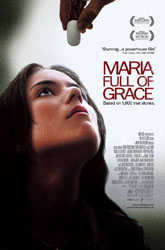 Director:
Joshua Marston
Starring:
Catalina Sandino Moreno
Patricia Rae
Guilied Lopez
Orlando Tobon
John Ńlex Toro
Yenny Paola Vega
Release: 16 Jul. 04
IMDb
|
Maria Full of Grace 
BY: DAVID PERRY
Taking what was an effective 30 minute subplot in Alastair
Reidís Traffik miniseries (not the atrocious made-for-American-cable
bastardization of it) and devoting a very long two hours to it, Maria Full
of Grace maybe one of the most graceless films to come out of Sundance this
year. The characters are broad and barely recognizable, and the screenplay
never diverts from its completely transparent route. I fear that this is the
type of proto-neo-realism that people enervated by years of Larry Clark and
Harmony Korine will latch onto. Like their films (though this isnít near as
risible as some of their work), Maria Full of Grace has a statement and then
spends forever pounding into the skulls of the audience. It tries to seem
observant, but is actually just obnoxious.
Looking at the opportunities for the impoverished women of Columbia, this
How to Become a Mule story is the type of fully obvious morality story that
is a dime a dozen in independent films. Just because there are subtitles and
some shaky camera work doesnít make this any more notable. Worst of all, the
ways the director attempts meaningful gestures towards symbolism are so
painfully overwrought that they lose any impact. By the time Maria is given
her communion, small, round pouches of cocaine, the filmís virgin mother
dynamic becomes less a fear for the audience (would any director be dumb
enough to pound the symbols in so noticeably?) and more an certainty.
I know Iím being harsh on Joshua Marston, a novice filmmaker who at least
deserves credit for making a film about something he likely doesnít know
much about. Maria Full of Grace, whatever blatant misfires it may unfurl is
a film that means well, and the directorís decision to at least make a
statement about the drug smuggling situation in Columbia. I just feel that
his decision to make a movie out of it was unwise -- this story could have
done well as a novel, where symbols are often heralded no matter how
barefaced they are.
 |

